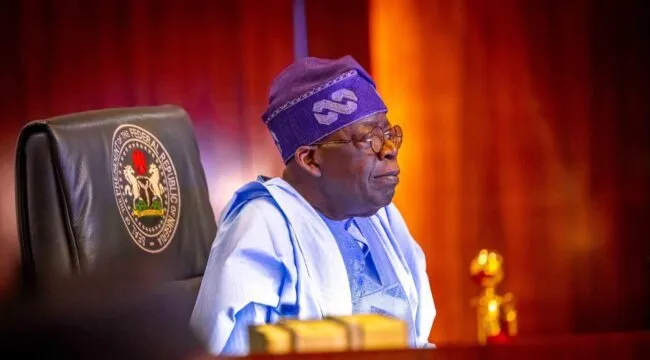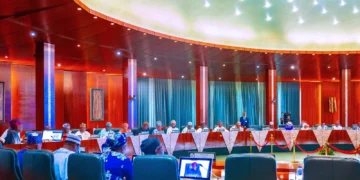As President Bola Tinubu unveils his ambitious “Nigeria First Policy” amid a flurry of federal approvals worth billions, one can’t help but ask: Are we witnessing the dawn of an economic renaissance or just another government slogan destined for the graveyard of unfulfilled promises?
Last Monday’s Federal Executive Council (FEC) meeting was nothing short of a spending spree, with over N750 billion approved for road projects nationwide, alongside a bevy of other initiatives. At the center of it all was Tinubu’s grand pronouncement of a policy that supposedly “beckons a new era of local content enterprise, self-belief and national pride.”
The words sound magnificent, don’t they? But Nigerians have heard magnificent words before.
“We will make what we use and use what we make – not as a slogan, but as a national commitment,” declared the President. The sceptic in me can’t help but wonder if this commitment will last longer than the ink takes to dry on the memorandum.
Let’s be clear: protectionist policies aren’t novel concepts. They’ve been deployed by nations at various stages of economic development, often with mixed results. What’s different this time, according to the administration, is the comprehensive approach and the will to enforce it.
The Bureau of Public Procurement (BPP) has been directed to “immediately revise and enforce procurement guidelines to prioritise locally made goods and homegrown solutions.”
All ministries, departments and agencies (MDAs) are now forbidden from procuring foreign goods available locally without written waivers. Breaches will attract sanctions, including contract cancellations and disciplinary actions.
It sounds impressive on paper. But we’ve been here before, haven’t we?
Remember the “Buy Nigerian to Grow the Naira” campaign? Or the endless iterations of local content policies that somehow never managed to dent our insatiable appetite for imports? The graveyard of Nigerian economic policies is filled with well-intentioned initiatives that failed at implementation.
The fundamental challenge isn’t crafting policies – it’s implementing them in a system that has historically rewarded, as Tinubu himself acknowledged, “dealmaking over real investment.”
Meanwhile, the Works Ministry was busy announcing road projects worth over N750 billion. Minister Dave Umahi spoke proudly of “rescoping” inherited projects to align with “current budgetary realities.” Translation: We’re redesigning projects because we can’t afford what was promised.
The Sokoto-Zamfara-Katsina-Kaduna Road project is particularly telling. Originally awarded for N105 billion to cover 375km, it has now been “rescoped” to just 82.4km – while retaining the same budget. Make of that what you will.
Perhaps most intriguing was Umahi’s update on the Lagos-Calabar Coastal Highway, a project that has raised eyebrows due to its enormous cost. According to the minister, both the Dutch Bank and Development Bank of Southern Africa have reviewed the procurement process and found it “excellent” and even “undervalued.” A rare endorsement indeed, if true.
In the health sector, Prof. Ali Pate warned of potential cholera outbreaks as the rainy season approaches, with over 18,700 cases already recorded this year. One wonders how the “Nigeria First Policy” will address this immediate health challenge.
The power sector wasn’t left out of the announcement frenzy. Minister Adebayo Adelabu proudly presented Nigeria’s first-ever National Integrated Electricity Policy, mandated by the revised Electricity Act of 2023. The policy, we’re told, will be reviewed every five years – assuming we remember it exists by then.
Let’s be frank: Nigeria doesn’t suffer from a shortage of policies. We drown in them. What we lack is consistent implementation, transparent monitoring and genuine accountability.
The directive to the BPP to create a “Local Content Compliance Framework” is commendable, but who will ensure the framework itself is followed? Who will monitor the monitors?
Our history is littered with similar bold pronouncements. Remember when every government agency was supposed to use only Nigerian-made vehicles? How did that work out?
The exceptions soon swallowed the rule.
For Tinubu’s “Nigeria First Policy” to succeed where others failed, it must address the fundamental issues that have historically undermined similar initiatives: corruption, lack of capacity in local industries, quality concerns, and the simple economic reality that sometimes, imports are genuinely more cost-effective.
The sugar industry example cited in the policy presentation is instructive. Despite years of backward integration programmes and protection, we still import significant quantities of sugar. Local production simply hasn’t kept pace with demand, despite all the incentives and policies.
However, it would be unfair not to acknowledge the potential positives. If properly implemented – and that’s a massive if – this policy could indeed stimulate local industries, create jobs, and reduce our dependency on imports. The emphasis on technology transfer and skills development in contracts where no local options exist is particularly promising.
The rehabilitation of dams and irrigation projects, expected to impact over 30,000 farm families and unlock 50,000 acres of farmland, aligns perfectly with the food security objectives that should be at the heart of any Nigeria First approach.
As we stand at what the government calls “the beginning of a new era,” Nigerians would do well to maintain cautious optimism. We’ve heard promises before; what we need now is performance.
“Let this day mark the beginning of a new era of local enterprise, self-belief, and national pride,” declared President Tinubu. Fine words indeed. But as the saying goes, the proof of the pudding is in the eating.
For now, the “Nigeria First Policy” joins a long list of well-articulated initiatives waiting to prove their worth. Will it truly transform our procurement practices and economic landscape, or will it become yet another policy that existed more in pronouncement than in practice?
Time, as always, will tell. And Nigerians, as always, will be watching.





